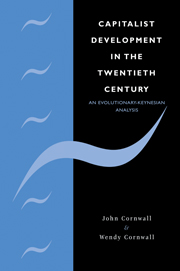Preface
Published online by Cambridge University Press: 22 September 2009
Summary
This book deals with economic development, and with macroeconomic performance in the context of capitalist development. In addition to explaining the macroeconomic record, for example rates of growth, inflation and unemployment, we explain the interaction of economic variables with the changing structural features of the economy in the course of capitalist industrialization and transformation. This requires a framework suited to analysing a more complex economic reality than mainstream economic theory can encompass. This complexity arises from two sources. First, we include institutions among the structural variables, and the impact of the distribution of economic and political power on these institutions. Second, we examine the interaction of economic performance with the structure of the economy to show how each causes changes in the other. This reaches beyond the ‘intellectual autarky’ of equilibrium analysis, in which structural variables influence the endogenous economic variables but are themselves subject only to unexplained change. Instead, our framework allows for changes both in the economic structure and in the performance variables to be generated within the system. In contrast to this evolutionary approach, mainstream theory focuses on equilibrium states and restricts itself to the less demanding task of establishing conditions for the existence and stability of the equilibrium.
To use our approach is to make what Nelson (1995, p. 85) refers to as ‘an intellectual bet that the price of added complexity is worth paying to buy the better ability to devise and work with a theory that rings right’.
- Type
- Chapter
- Information
- Capitalist Development in the Twentieth CenturyAn Evolutionary-Keynesian Analysis, pp. xiii - xviPublisher: Cambridge University PressPrint publication year: 2001

